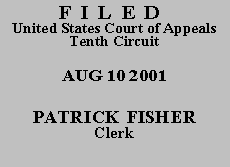

| YALE 41 ASSOCIATES LIMITED
PARTNERSHIP, an Oklahoma limited
partnership; YALE 41, INC., an
Oklahoma corporation; JAMES W.
DILL, individually and as president of
Yale 41, Inc.,
Plaintiffs - Appellants, v. FIVE SHOPPING CENTER COMPANY, a Kansas general partnership; MD MANAGEMENT, INC., a Missouri corporation; THE RICHARD J. DREISESZUN GRANTOR TRUST; SHERMAN DREISESZUN, individually and as trustee of the Richard J. Dreiseszun Grantor Trust; IRENE DREISESZUN and ROBERT J. O'HALLORAN, trustees of the Richard J. Dreiseszun Grantor Trust, Defendants - Appellees. |
|
Plaintiffs appeal the district court's grant of summary judgment in favor of defendants on their complaint alleging breach of settlement agreement and seeking enforcement of a liquidated damages' provision therein. We review a grant of summary judgment de novo, applying the same legal standard as that used by the district court. Anderson v. Coors Brewing Co., 181 F.3d 1171, 1175 (10th Cir. 1999).
The parties are familiar with the facts and we only very briefly summarize those necessary to resolve this appeal. The parties' June 3, 1998 settlement agreement provided, in part, that the defendants in this action would use their best efforts to secure the release of plaintiff James W. Dill as a guarantor on a construction loan and on a performance and payment bond. The agreement further provided that the defendants would pay liquidated damages totaling $500 for each day after June 15, 1998 that Mr. Dill was not released. Plaintiffs' complaint alleged that defendants breached their obligation to timely obtain these releases, an allegation denied by defendants, and sought to enforce the liquidated damages provision. Both parties filed motions for summary judgment. Sitting in diversity and applying Oklahoma law, the district court granted defendants' motion, ruling that the liquidated damages provision constituted an unenforceable penalty under Oklahoma law.
By statute in Oklahoma, a contractual provision in which damages for breach are determined in anticipation of that breach is void unless, from the nature of the case, it would be impracticable or extremely difficult to fix the actual damages. See Okla. Stat. Ann. tit. 15, §§ 214 and 215(A). If the liquidated damages provision constitutes a penalty, the provision will be deemed void even if the damage resulting from a breach would be difficult to ascertain. Sun Ridge Investors, Ltd. v. Parker, 956 P.2d 876, 877 (Okla. 1998); Waggoner v. Johnston, 408 P.2d 761, 769 (Okla. 1965). Oklahoma courts
identify three criteria by which a valid liquidated damages clause may be distinguished from a penalty: 1) the injury caused by the breach must be difficult or impossible to estimate accurately; 2) the parties must intend to provide for damages rather than for a penalty; 3) the sum stipulated must be a reasonable pre-breach estimate of the probable loss.
Sun Ridge, 956 P.2d at 878. "It is well settled that in determining whether a particular clause calls for liquidated damages or for a penalty, the name given to the clause by the parties is but of slight weight, and the controlling elements are the intention of the parties and the special circumstances of the case." Fretwell v. Protection Alarm Co., 764 P.2d 149, 152 (Okla. 1988) (quotation omitted).
The burden of demonstrating that damages would be difficult to ascertain and that the liquidated damages provision does not impose a penalty rests on the party seeking to enforce the stipulated damage provision. Waggoner, 408 P.2d at 768. In Sun Ridge, the Oklahoma Supreme Court held that a $5 per diem late charge in a residential lease agreement constituted an unenforceable penalty because the landlord failed to satisfy this evidentiary burden. 956 P.2d at 878-79. The landlord presented "general assertions" from its property manager about the difficulties encountered when a renter fails to pay rent on time, but "offered no evidence of their actual costs of collection," and no evidence indicating how any such actual costs compared to the stipulated late fee. Id. at 878-79.
Here, as in Sun Ridge, the plaintiffs simply failed to meet their evidentiary burden of proof. A party opposing summary judgment "must bring forward specific facts showing a genuine issue for trial as to those dispositive matters for which it carries the burden of proof." Jenkins v. Wood, 81 F.3d 988, 990 (10th Cir. 1996). As stated by the district court, plaintiffs presented "no evidence that the parties undertook to estimate the anticipated amount of potential damages, or that the amounts reflected in the agreement represent[ed] any such estimate." Aplt. App., Vol III at 778. We agree with the district court's conclusion that plaintiff failed to present any evidence that the parties intended to provide for damages rather than for a penalty or that the liquidated damages amount in the settlement agreement was a reasonable pre-breach estimate of Mr. Dill's loss. See Sun Ridge, 956 P.2d at 878. Moreover, plaintiffs did not allege actual damages in their complaint or present evidence that Mr. Dill actually suffered any loss as a result of the alleged breach.
The district court correctly articulated and applied Oklahoma law and the record supports its findings. Thus, we AFFIRM the district court's judgment for substantially the reasons set forth in its order dated November 6, 2000.
Entered for the Court
Circuit Judge
*. This order and judgment is not binding precedent, except under the doctrines of law of the case, res judicata, and collateral estoppel. The court generally disfavors the citation of orders and judgments; nevertheless, an order and judgment may be cited under the terms and conditions of 10th Cir. R. 36.3.